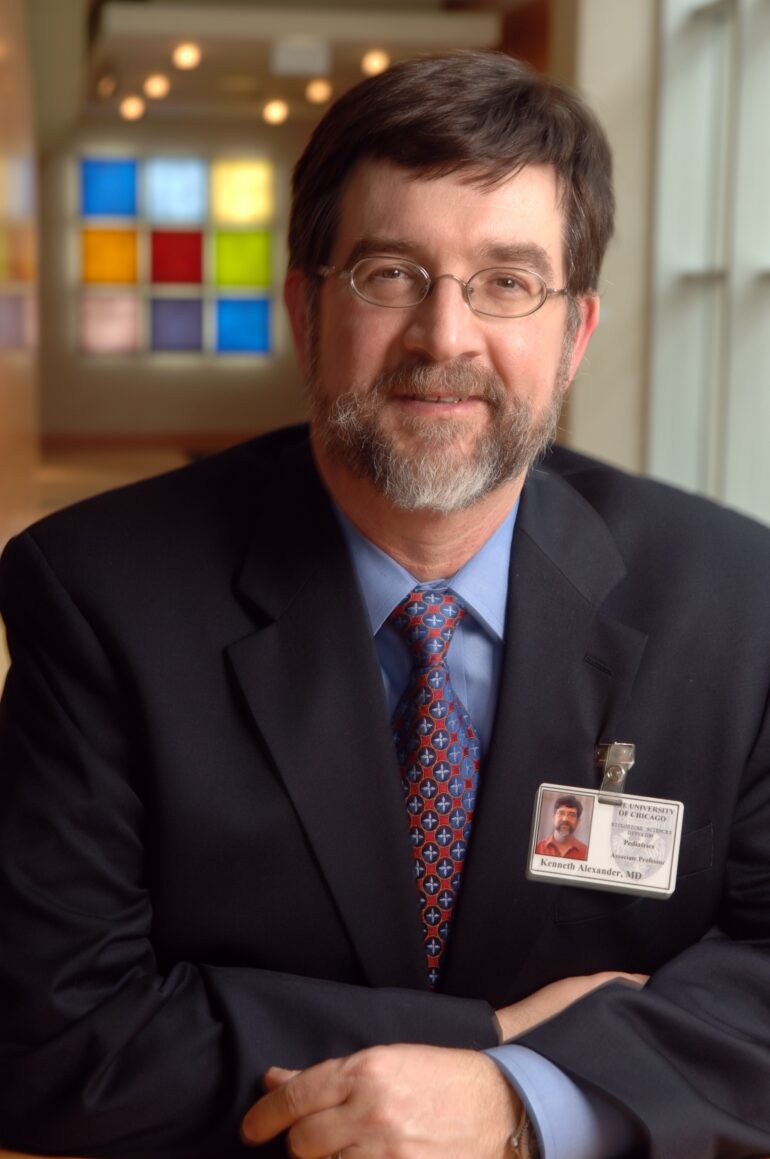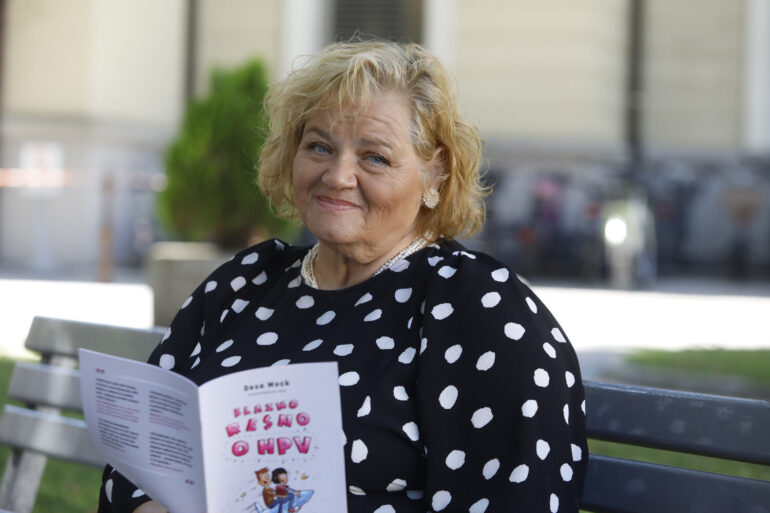We recently spoke with an extremely prominent American doctor, Dr. Kenneth Alexander, Chief of Infectious Diseases and Vice President of Research at Nemours Children's Hospital in Florida. Clinical interests of Dr. Alexandra include neonatal infectious diseases and immunization promotion.
He visited Slovenia with the aim of discussing the importance of the health of children and adolescents. He particularly emphasized the importance of vaccination, especially against human papillomaviruses (HPV, also human papillomaviruses). He revealed to us many interesting and informative aspects about vaccination and ways in which doctors and health professionals can improve communication with adolescents and their parents.

Understanding, empathy and support are key
dr. In the conversation, Kenneth Alexander emphasized what is already known - when it comes to children, parents want to make the right decision, but when it comes to thinking about HPV vaccination, they often face a feeling of discomfort. The renowned doctor is of the opinion that this is completely natural, as it is a sensitive topic. The thought of their children being sexually active can be quite uncomfortable for many parents. However, he emphasizes the importance of providing support to parents by doctors and health professionals, especially by answering their questions.
dr. Alexander described the problem that actually got the US thinking that something was wrong: "The children were not vaccinated because the doctor didn't even mention vaccination. So we were at a loss for recommendations. We now know that if we only mention vaccination and recommend it, parents will decide to take this step. In one of the surveys, we asked parents whether they would opt for the HPV vaccination if they received a recommendation from a doctor. Almost 79 %s answered yes.”

He also observes that health professionals are under too much time pressure, which makes them unable to talk to patients properly. She emphasizes that it is crucial to take the time to build a relationship with the entire family and show parents that they truly care about the health and future of their children and youth.
"In the US, we tackled everything quite simply. The message we give to parents is: "Your child is 12 years old. During this time, we recommend HPV vaccination for everyone, both boys and girls. We do this to prevent cancer. Let's prevent cancer today." And this approach is successful, as almost 80 % parents decide to get vaccinated at that moment without hesitation."
Do you think parents are scared when they learn that HPV viruses are sexually transmitted?
Yes, most of them, at least the moms, are shocked. They are not yet ready for this thought. Even if they conceived this child exactly in such a way. (smile)
We often hear the question: Why vaccinate a child at 11 or 12 years old, when he is not yet sexually active? How do you answer that?
This is a completely normal feeling. But we have to keep in mind that we are focusing on cancer prevention, which is actually our goal. Once we begin to associate it with sexuality, the next step is to associate it with morality. And all of a sudden we start persecuting or judging people for something that everyone does. Meanwhile, we forget that the result is that people are exposed to the risk of cancer. So I think we have a problem because by focusing on sexuality we miss the real purpose, which is to prevent cancer. However, it is important to know that the vaccine actually works better at age 12. That's when we have a better immune response.
You are a renowned epidemiologist. What do you consider success in your journey?
Parents would do anything to save their children. That's what I did, and that's also why I vaccinated my daughter - they were the first in Chicago.
The importance of correct and understandable communication
One of the key challenges that the American doctor spoke about is the lack of basic information that parents face. Sometimes the multitude of different concepts they hear is simply too much to handle.
Despite all the information technology and information available, it is unfortunately not enough. The health sector simply needs to learn how to effectively communicate HPV vaccination to both parents and children. He also showed an example of the wrong approach taken in the US, where parents were presented with all the details of vaccines at length, which proved to be ineffective. Instead, it now encourages a simpler approach, where parents are simply told why the vaccine is important for both girls and boys, without burdening them with details about diseases and statistics.
Where else do you see a deficit in the health care system?
I think a resource that we underutilize are nurses. Patients trust them even more than doctors. I think it is a mistake that we have not fully utilized the talents of our nurses. And that we need to both educate and teach our nurses about HPV, because there is no reason why a nurse should not be able to talk to a patient or a parent. Going a step further, nurses outnumber doctors in the United States by a ratio of 13:1. So you're more likely to run into a nurse at the grocery store or at church or wherever you are than a doctor. The nurse's recommendation is and will be very important. So if I had to give advice to the healthcare and pharmaceutical industries, I would advise them to focus more on nurses.
Do you think it is right for parents to say that they are afraid to vaccinate their children?
It's not about whether it's right or wrong. It is important that the doctor connects with the parents and does not dismiss them. He must listen to them. Let's say a parent has read somewhere that the HPV vaccine causes infertility. The doctor must tell and show that the parent is listening. Not only listening to him, but hearing him. The parent expressed concern that the vaccine would cause infertility. “Yes, this is a question many parents ask. Half a billion doses have already been administered worldwide. Countless studies have been done and no one has actually proven that the vaccine is associated with infertility.”
It is extremely important that the doctor connects with the parent. It's about trust.
Involvement of schools is essential for HPV awareness
Slovenia has adopted a unique approach to vaccination and education programs that focus on using schools as a key tool to improve public health, according to an American doctor. This approach, while perhaps somewhat unconventional, has distinct advantages.
dr. Alexander also kindly explained that many countries did not choose the same path. As an example, he cites the USA, where they do not use cooperation with schools as an option to raise awareness of the importance of HPV vaccination.
In his opinion, Slovenia deserves recognition for its exceptional screening program for cervical cancer. This program is among the best in the world, the result of the dedication of gynecologists and public health experts.
If you haven't been infected with HPV, it's almost a miracle
dr. Alexander explains: "The probability that someone has been infected with HPV in their lifetime is 80%. In other words, having HPV is more normal than not having it. If you haven't had one before, it's a little weird. (smile) The good thing is that for the vast majority of people it disappears and has no consequences. That's why you can't actually know when you've been infected with HPV, and it's also important to know that HPV infection doesn't mean infidelity. A person may have been infected with HPV at the age of 16. And in fact, it can take literally decades before we know that, or before potentially precancerous changes develop.”
This year, a brochure circulated throughout Slovenia "Brokenly Serious About HPV" with the text by Desa Muck and witty illustrations by Matej de Cecco, who reveals the facts about this sexually transmitted virus in a popular way, emphasizing the risks and the importance of vaccination. The brochure provides all the key information and promotes awareness and prevention.
Security concerns
Regarding the concerns parents have about HPV vaccination, Dr. Alexander points to research that proves that the HPV vaccine is safe, but at the same time it does not change the sexual behavior of young people. "The HPV vaccination is in no way a license for a child to be sexually active right away. That would be like saying that wearing a seat belt makes you drive like crazy. In reality, people who wear seat belts probably drive more carefully.'
“I don't want 12-year-olds to be sexually active either. That's not the point. It's about protecting them from cancer. So we vaccinate our children, but we still talk about morality and safety and their values.” says more.
Finally, Dr. Alexander stressed the importance of proper communication, trust and mutual respect. This is the only way we can make the best decisions for the health of our children and adolescents.








